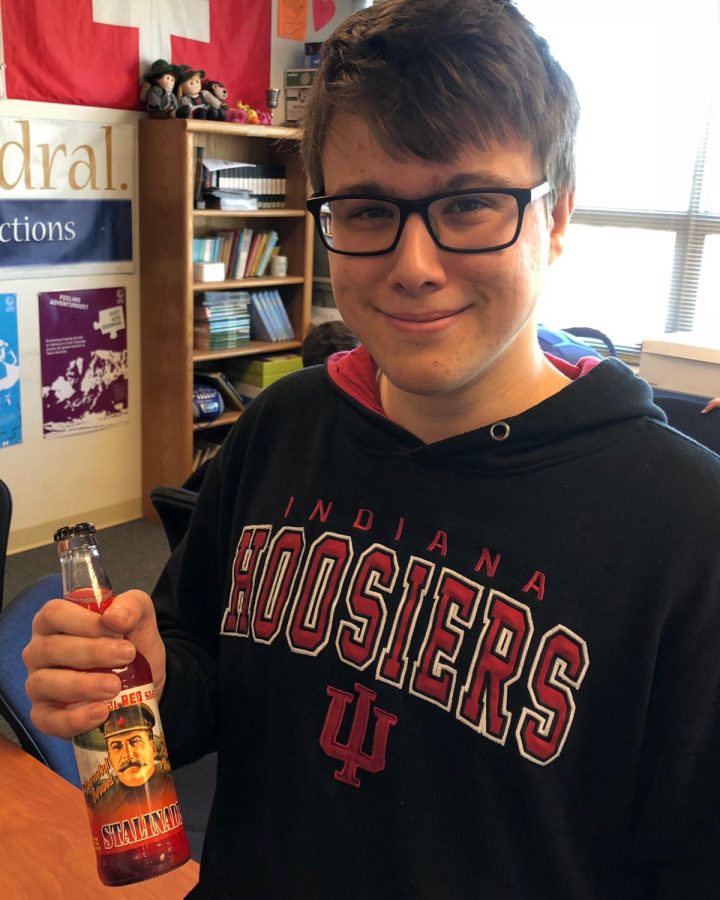Dual citizenship provides perspective for senior
Bishop has both American and Russian status
Senior David Bishop received Stalinade soda for his birthday. Bishop is both an American and Russian citizen.
In the movie “Miracle,” which tells the story of the United States hockey team upsetting what at the time would have been the Soviet Union in the 1980 Olympics, a scene showcases many Americans’ hatred of Russia at the time.
Herb Brooks, the team’s coach who is portrayed by Kurt Russell, tells his wife that of the thousands of telegrams the team has received, one from a little old lady had a simple message: “Beat those Commie bastards.”
Move forward another few decades, and the Russian meddling in the 2016 elections fills up Twitter feeds and provides the bulk of coverage in the media.
Yet American/Russian dual citizen senior David Bishop sees Russia differently than perhaps most Americans. Bishop is known for having an immense vocabulary, possessing a quick-witted humor and, of course, for being Russian.
Even though some Americans may not love Russia, David has never experienced any opposition. Though there may be teasing, “I have never felt any actual racial bias or bullying,” he said. Bishop often goes back and forth with junior Tim de Boer, who is from Germany, as they good-naturedly pick on each other.
Bishop was born in Russia, but because of his father’s military status, qualifies as an American born abroad. This status is on his birth certificate permanently and was approved by the Russian and American consuls back in 2000. So, David grew up as and is currently a dual citizen with Russia.
Though it can be complicated.
The United States does not recognize citizenship with Russia, which means that while he is on American soil, David is exclusively an American. Russia has the same policy. Russia only recognizes Bishop’s Russian citizenship, so he is a Russian living in America. Interestingly, this status does not infringe upon voting rights so Bishop is able to vote in both American and Russian elections.
Within the past 18 years, Bishop has visited his country of birth a handful of times, the most recent being in the summer of 2016. Overall, he spent two full summers and a large portion of a winter in Russia.
Part of Bishop’s interaction with Russian culture includes his fluency in the language. To Americans, Russian is considered extremely challenging to learn and is ranked in the fourth category out of five by the foreign Service Institute in difficulty. Bishop appreciates being able to speak a language that very few people know. However, he never considered his experiences with learning Russian to be hard.
He said, “I never really had to learn Russian because it was spoken in my family; I never needed to study it.
“There was a time when, between learning English grammar at school and speaking Russian at home, my Russian wasn’t good; however, I just needed to brush up on it over time and now I have no problems.”
Bishop still speaks Russian at home on a daily basis.
He also enjoys his culture because of its history. “Russian history is very long and rich, so that has always been something I’ve been fascinated with.”
Bishop intends on attending Indiana University next fall to study international affairs and hopes to one day work for the State Department. Though international politics have always been interesting to him, his dual citizenship has influenced his interest in the world outside of just the United States. He is also extremely knowledgeable in history, both American and of other countries.
“The fact that I have grown up with a slightly more international perspective probably gave me an interest early on, but I have enjoyed learning about the world for as long as I can remember though,” Bishop said.
This international perspective has also influenced Bishop’s daily life. Though he lives with his parents and siblings as most Americans do, most Russians have three-generation homes, consequently causing most Russians to be raised by their grandparents as their parents work.
Bishop’s political views have also been formed by the fact that he sees issues in a perspective not solely based on American mindset.
He said, “I can compare ‘this is what the Russians do’ and ‘this is what the Americans do,’ and that has influenced me to view things in a broader sense.”
A recent scandal in the Olympics gave an example of Bishop’s interest in politics and his larger perspective. When the Olympic Committee decided to allow individual Russian athletes to compete, but not the country of Russia, Bishop felt this was unfair. Though he agreed that athletes guilty of doping should be excluded, “to say ‘you can’t carry the Russian flag’ or to abolish the Russian national anthem — I believe that was unjust.”
Bishop said he is proud of both countries and thankful for his dual citizenship.







